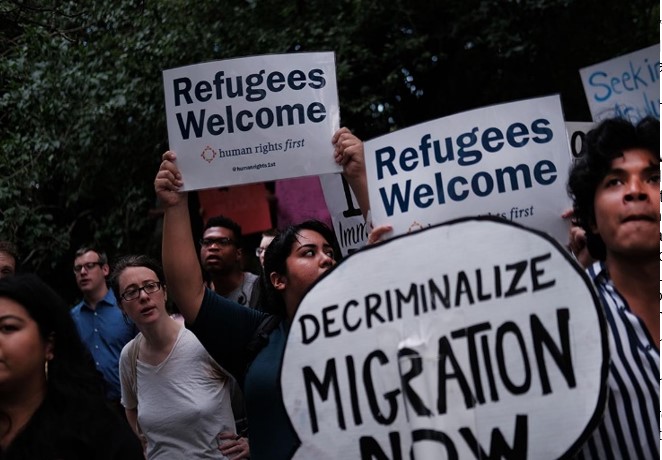
The 21st Century: An age of imprudent international borders and migrant hostility
By Rosie Peacock
Imagine devoting sizeable fragments of your life to radical excursions, overcoming inconceivable physical and mental barriers, all to achieve one sole objective. Typically for migrants, that one objective is simply to better their quality of life socially, economically and in various cases, politically, yet in this bleak and unjust 21st century we live in today, the harsh realities of modern society make these goals tough to reach.
The era we live in should be deemed the age of borders, and not just a period that highlights the significant influx of migrants. For centuries, migrants have been relocating all over the world, however what makes the 21st century dissimilar to past times is the way in which people are being subjected to new forms of state control, such as borders. As of November 2018, scripted in the world population review, approximately 29 nations have physical border walls, fences, or barriers, with the most common motive of this control being to keep illegal immigrants away. Nations may think this is efficient, yet statistics still show that despite the borders, migrants still enter countries, not with malevolent intentions, but to grasp the opportunities available in certain places. Physical borders in place promote migration through different ways, including entering through geographical borders, such as the world’s largest oceans. The question to ask however, is when will the Mediterranean being converted into a “mass grave”, and the substantial number of deaths amongst migrants during their travels (e.g. 1,300 drowned in the Mediterranean in 2019) be enough for nations to take a step back. Migrants are constantly targets of social, economic, and political hostility. They are rejected by society for being “foreign born”, for their ethnicity, their norms, and their values, thus causing them to feel extremely alienated. More emphasis needs to be placed on migrant’s wellbeing, as opposed to deeming them as intruders in society.
In addition to this, there is a fine line between what is forced to stay and what is made to move, and it is extremely important to remember that people aren’t the only things that change between nations. Colonialism reiterates that while people are forced to remain, the resources and revenue produced within colonies can leave and be sent to the coloniser. Capital and natural resources need no citizenship, yet can enter any country wherever and whenever, but migrants are forced to stay in their countries of origin due to their nationality and lack of capital. This just simply is not fair, and the bigger picture of migrants being beneficial to their host nations needs to be respected.
There is an ongoing stigma that migrants are “job stealers” and that they are to blame for mass unemployment in some countries, however this is a massive generalisation to make. In Canada for example, in 2018, 26% of Canada’s core-aged workforce was made up by immigrants, and they were responsible for 52% of the employment increase between 2016-2017. These figures are promising, and they indicate the positive attributes of immigrants within a workforce, and in turn it is important to acknowledge the knock-on encouraging effects this has on economic growth. In all, migrants occupy gaps in the labour force, and they fill the job shortages in sectors that are not appealing to the host population. Immigration can bring substantial benefits to advanced economies by boosting GDP per capita and standards of living, but this seems to be ignored as is reflected in the ever-growing epoch of imprudent borders.
We need to understand migrants as people, and not just subjects to coherent hostility. Some nations welcome diversity, for example in Canada over the past 20 years, nearly 5 million immigrants applied and were granted entry into the country, but the vast majority only entered after Canada chose them. This is just one example of overcoming stigma and recognising the economic value of migrants in certain places. These people however are regarded as legal immigrants, yet those with the same intentions, norms, and values even potentially from the same country of origin, are denied access due to their lack of wealth, and are deemed illegal. No matter the level of skill, the rate of literacy, and their excessive/lack of affluence, it is wrong to pick and choose who may be a beneficial attribute to a population, and who is deemed a target of deportation. These stigmas and assumptions placed on migrants has an ongoing impact on their mental wellbeing, and as a global society we need to establish ways to treat them as equals.

0 Comments